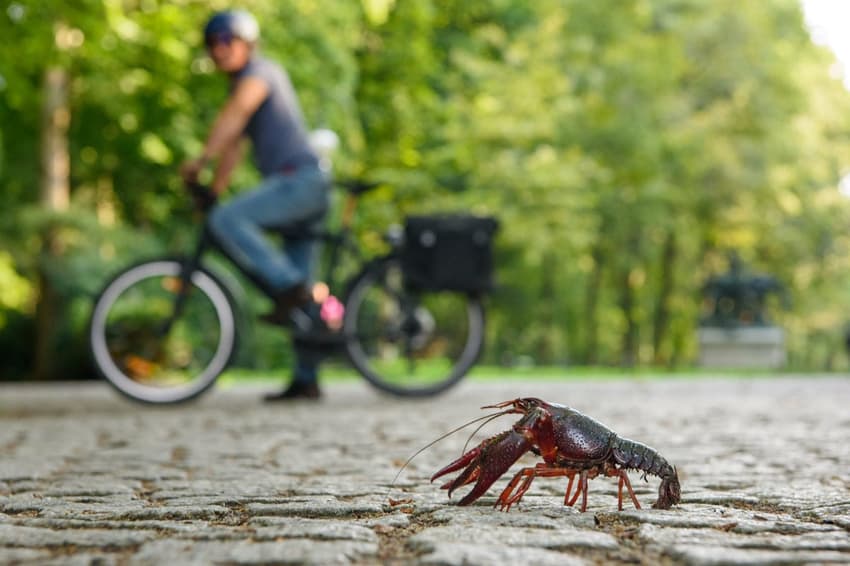'Invasive' American red crayfish are being spotted daily in Berlin park

They are grilled and eaten in some countries, but in Berlin crayfish have been scuttling across streets and pathways in and around Tiergarten park.
Originally from North America, red swamp crayfish that grow up to 15 centimetres long have been creating quite a fuss amongst passersby in the capital.
"We’ve been receiving telephone calls almost daily from people who report sightings of the migratory animals," Ulrike Kielhorn, an expert at the Nature and Biodiversity Conservation Union (NABU) said last week.
The calls have been in regards to a species of American freshwater crayfish known as Louisiana crayfish. The crustaceans have small thorns on their nippers and are considered an invasive pest despite the fact that they’re enjoyed as a delicacy in other parts of the world.
This isn't the first time this particular crustacean has been spotted in Germany, though. In 2014, employees at a community swimming pool in Frankfurt spotted them after a strong thunderstorm on the premises.
But this year, they’ve been sighted on "a massive scale," said Kielhorn.
The crayfish are also on the move right now because of the high water levels from the rainy summer, wild animal expert Derk Ehlert suspects.
The crustaceans live in holes which they dig themselves in embankment areas, Ehlert explained.
"As the water rises, they leave the sinking ship.”
#Humboldt started exploring #Berlin, and then the #world. Me and a #crayfish in #Tiergarten #MyHumboldtWeek #Exploration #SciComm #Curiosity pic.twitter.com/xojut8317h
— Guillermo Orts-Gil (@GuilleOrtsGil) July 14, 2017
The red swamp crayfish is on the European Commission’s list of invasive alien species. They argue the crayfish are to be kept as far as possible from Europe because they displace native crayfish populations.
According to NABU, the crustaceans could be dangerous for native crayfish species because they can carry and spread fungal diseases.
But it’s forbidden to catch the crayfish as that would legally be considered poaching.
Collecting all of the crustaceans wouldn't be useful, adds Ehlert.
“There are already too many."
Comments
See Also
Originally from North America, red swamp crayfish that grow up to 15 centimetres long have been creating quite a fuss amongst passersby in the capital.
"We’ve been receiving telephone calls almost daily from people who report sightings of the migratory animals," Ulrike Kielhorn, an expert at the Nature and Biodiversity Conservation Union (NABU) said last week.
The calls have been in regards to a species of American freshwater crayfish known as Louisiana crayfish. The crustaceans have small thorns on their nippers and are considered an invasive pest despite the fact that they’re enjoyed as a delicacy in other parts of the world.
This isn't the first time this particular crustacean has been spotted in Germany, though. In 2014, employees at a community swimming pool in Frankfurt spotted them after a strong thunderstorm on the premises.
But this year, they’ve been sighted on "a massive scale," said Kielhorn.
The crayfish are also on the move right now because of the high water levels from the rainy summer, wild animal expert Derk Ehlert suspects.
The crustaceans live in holes which they dig themselves in embankment areas, Ehlert explained.
"As the water rises, they leave the sinking ship.”
#Humboldt started exploring #Berlin, and then the #world. Me and a #crayfish in #Tiergarten #MyHumboldtWeek #Exploration #SciComm #Curiosity pic.twitter.com/xojut8317h
— Guillermo Orts-Gil (@GuilleOrtsGil) July 14, 2017
The red swamp crayfish is on the European Commission’s list of invasive alien species. They argue the crayfish are to be kept as far as possible from Europe because they displace native crayfish populations.
According to NABU, the crustaceans could be dangerous for native crayfish species because they can carry and spread fungal diseases.
But it’s forbidden to catch the crayfish as that would legally be considered poaching.
Collecting all of the crustaceans wouldn't be useful, adds Ehlert.
“There are already too many."
Join the conversation in our comments section below. Share your own views and experience and if you have a question or suggestion for our journalists then email us at [email protected].
Please keep comments civil, constructive and on topic – and make sure to read our terms of use before getting involved.
Please log in here to leave a comment.